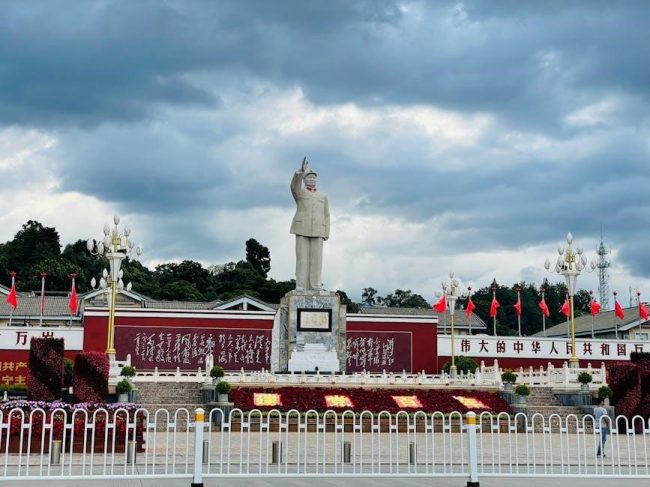Political slang in China reflects the dynamic interplay between governance, culture, and public discourse, offering insights into societal attitudes and the evolving political landscape.
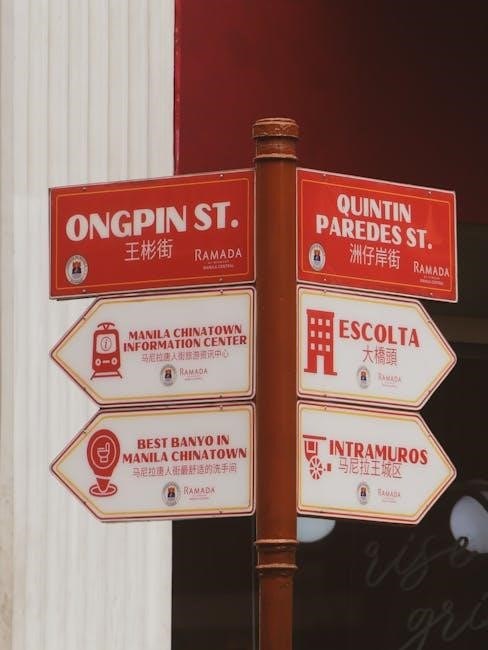
1.1 Overview of Political Slang
Political slang in China often emerges as a creative response to censorship and societal constraints. It serves as a subtle means of expressing dissent or criticism without directly challenging authorities. These terms frequently originate from internet culture, reflecting the dynamic interplay between governance and public sentiment. By using coded language, individuals navigate restrictions on free speech, making slang a powerful tool for both humor and hidden commentary on political issues.
1.2 Importance of Understanding Political Slang
Understanding political slang is crucial for grasping China’s socio-political dynamics. It reveals underlying public sentiments, highlights censorship evasion tactics, and provides insights into the nation’s evolving governance. Slang often conveys critiques or support for policies, offering a window into the collective mindset. By deciphering these terms, one can better navigate China’s complex political and cultural landscape, fostering deeper connections with its society and governance structures.
1.3 Structure of the Guide
This guide is divided into eight comprehensive sections, each exploring a unique facet of political slang in China. Starting with an introduction, the guide delves into historical context, notable slang terms, the role of the internet, censorship, taboo topics, governance relations, and its impact on foreign relations. Each section builds on the last, offering a holistic understanding of how political slang shapes and reflects China’s socio-political landscape.
Historical Context of Political Slang in China
Political slang in China has evolved alongside significant historical events, reflecting shifts in governance, cultural norms, and societal responses to political change.
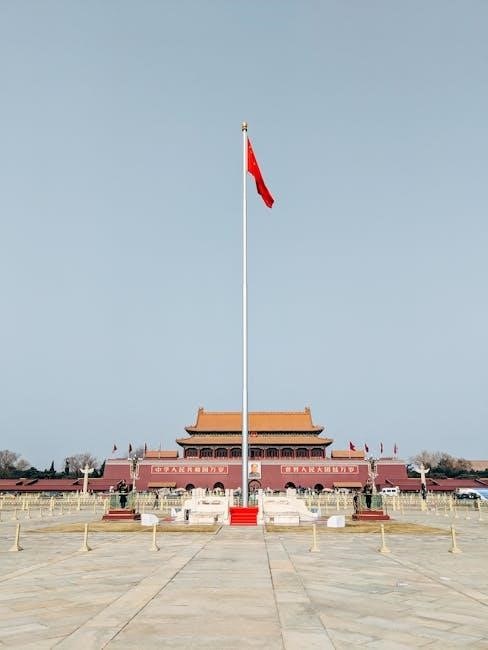
2.1 Origins of Political Slang
Political slang in China emerged as a response to the country’s complex historical and political landscape, offering citizens a subtle yet powerful way to express opinions and critique governance while navigating censorship.
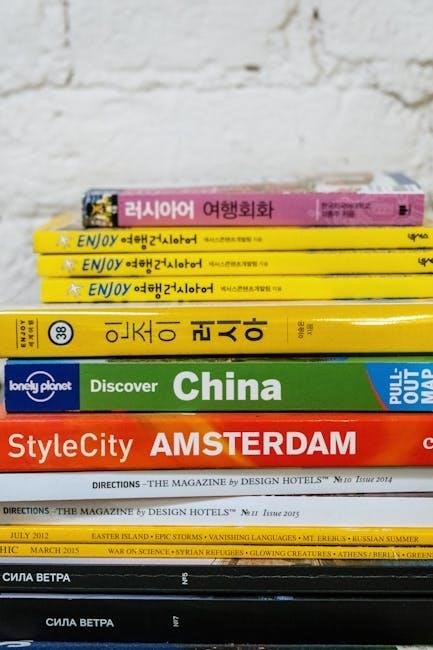
2.2 Key Historical Events Influencing Slang Development
Major events like the Cultural Revolution and Tiananmen Square have shaped China’s political slang, with phrases reflecting societal shifts and government policies, enabling indirect commentary on sensitive issues while avoiding direct confrontation with authorities.
2.3 Evolution of Political Slang Over Time
Political slang in China has evolved significantly, adapting to cultural shifts and censorship. The rise of the internet accelerated slang creation, enabling rapid dissemination of coded language. This evolution reflects changing societal attitudes and the creative ways people navigate restrictions on free speech, while also mirroring broader trends in governance and public discourse.
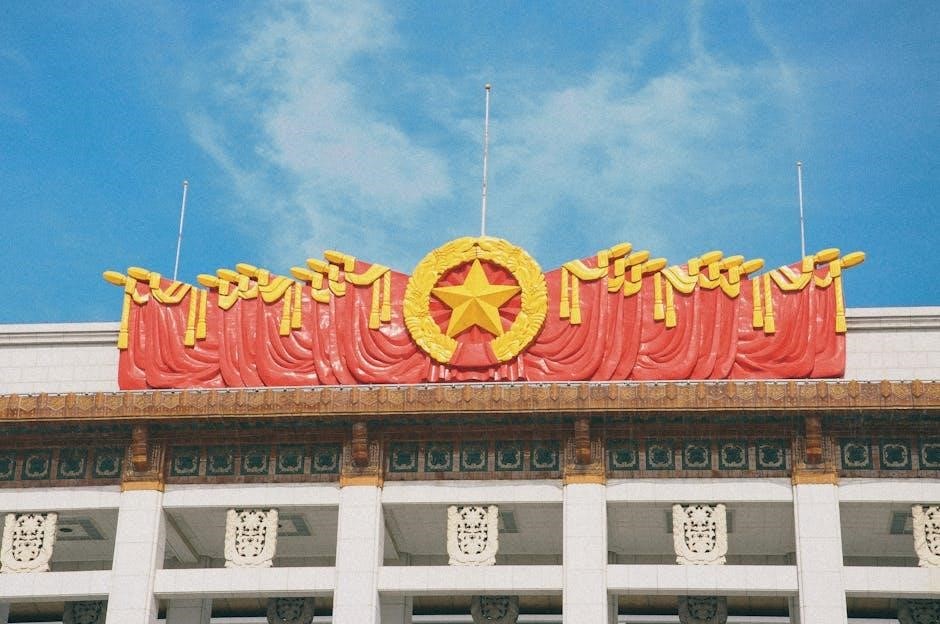
Notable Political Slang Terms in China
Notable political slang terms in China often reflect societal critiques or humor, such as “river crab” for censorship and “harmony” as a euphemism for censorship.
3.1 Commonly Used Terms and Their Meanings
Commonly used political slang in China includes terms like “river crab” (symbolizing censorship) and “harmony” (euphemism for censorship). Other terms like “Great Firewall” refer to internet censorship, while “50 Cent Party” describes state-sponsored commentators. These terms often arise from netizens’ creative ways to discuss sensitive topics subtly, reflecting both humor and critique of societal governance.
3.2 Examples of Slang in Modern Usage
Modern Chinese political slang often appears in online discussions. Terms like “river crab” humorously critique censorship, while “harmony” sarcastically refers to suppressed content. “Great Firewall” describes internet restrictions, and “50 Cent Party” mocks state-sponsored commentators. These expressions are widely used on platforms like Weibo, showcasing netizens’ creativity in addressing sensitive topics while navigating censorship constraints.
3.3 Regional Variations in Slang
Political slang in China varies by region, reflecting local dialects and cultural nuances. For instance, terms popular in Beijing may differ from those in Shanghai or Guangdong. Regional slang often emerges from local issues or governance styles, showcasing diverse perspectives. While some terms gain national traction, others remain confined to specific areas, highlighting the rich linguistic diversity within China’s political discourse.
The Role of the Internet and Social Media
The internet and social media have accelerated the spread of political slang in China, enabling rapid dissemination and adaptation of terms across online platforms like Weibo.
4.1 Spread of Political Slang Online
The spread of political slang online in China is rapid, with social media platforms like Weibo enabling viral dissemination of terms. Users often employ humor and metaphor to critique policies or leaders subtly. This online culture fosters a sense of community among netizens, creating coded language that evolves quickly to evade censorship. The internet’s anonymity allows for bolder expressions, making it a key space for political discourse.
4.2 Influence of Weibo and Other Platforms
Weibo, China’s equivalent of Twitter, plays a significant role in spreading political slang. Its vast user base and real-time nature allow slang to go viral quickly. Other platforms like WeChat and Douyin also contribute, with users creatively encoding political criticism. While these platforms enable rapid dissemination, they are closely monitored, forcing slang to evolve to avoid censorship. This dynamic highlights the interplay between technology, culture, and governance in shaping online discourse.
4.3 Government Monitoring of Online Discourse
The Chinese government employs advanced surveillance systems to monitor online discussions, including the use of political slang. Keywords and phrases are flagged, and accounts spreading sensitive content are censored or banned. This strict oversight forces netizens to innovate, creating coded language that evolves faster than censorship can adapt. Despite these measures, slang remains a powerful tool for discreet political commentary and social critique, reflecting the cat-and-mouse nature of online expression in China.
Censorship and Its Impact on Slang
Censorship in China shapes political slang by driving its evolution into coded, indirect language, allowing discourse while evading strict controls, reflecting the tug-of-war between regulation and expression.
5.1 How Censorship Works in China
Censorship in China operates through a complex system of monitoring and filtering online content, enforced by the Great Firewall. Keywords and phrases deemed politically sensitive are blocked, preventing their dissemination. This mechanism aims to suppress dissent and maintain control over public discourse. Online postings criticizing the government or its policies are often removed, reflecting the state’s effort to shape narratives and limit free expression, thereby influencing the evolution of political slang.
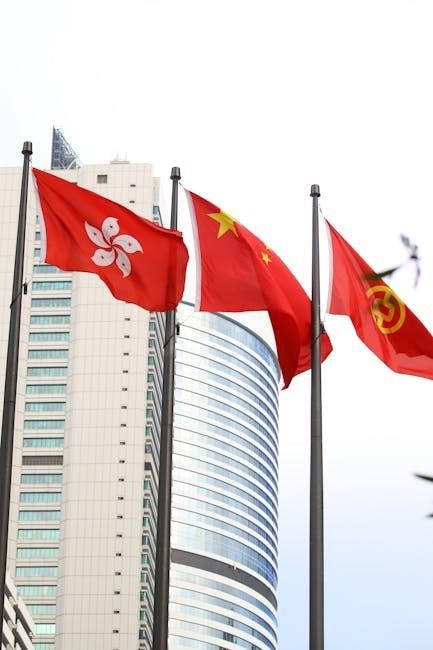
5.2 The Great Firewall and Its Role
The Great Firewall, also known as the Golden Shield, is China’s advanced internet censorship system. It monitors and blocks access to foreign websites and domestic content deemed politically sensitive. By filtering out banned terms and slang, it prevents the spread of dissenting ideas. This tool plays a crucial role in maintaining government control over online discourse, ensuring alignment with state narratives and restricting free expression in the digital space.
5.3 Examples of Banned Slang
Certain slang terms in China are banned due to their political sensitivity. For instance, phrases like “River Crab” (hexie) and “Grass Mud Horse” (caaonima) have been censored for their satirical critique of governance. Additionally, slang referencing forbidden historical events or criticizing leadership is swiftly suppressed. These restrictions highlight the government’s efforts to control narratives and maintain ideological alignment in public discourse, reflecting the broader context of censorship in Chinese society.
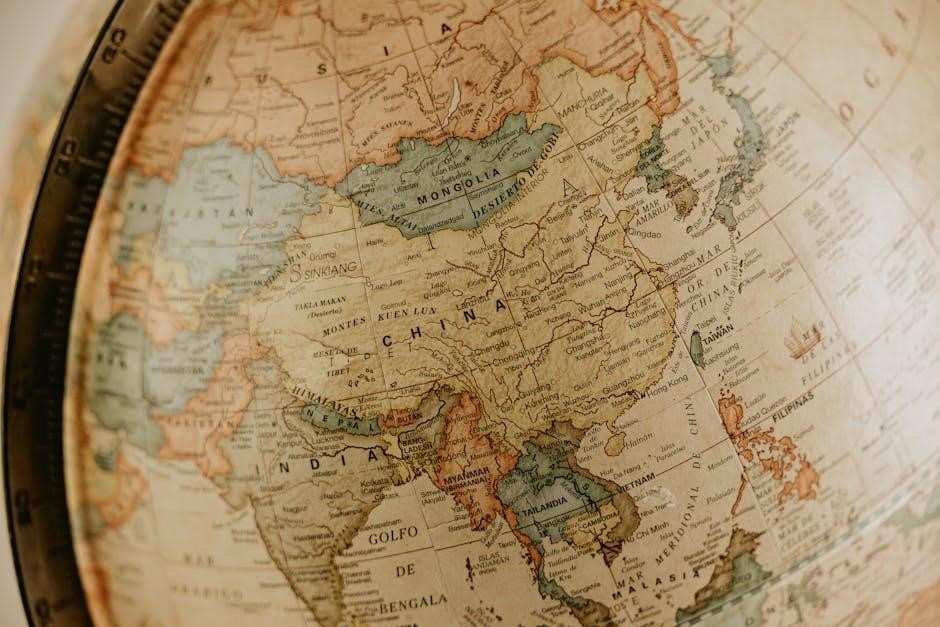
Taboo Topics and Slang
Taboo topics in China often involve sensitive political or historical issues, with slang emerging as a covert way to critique or discuss forbidden subjects discreetly.
6.1 What is Considered Taboo
Taboo topics in China include direct criticism of the Communist Party, historical events like Tiananmen Square, and issues of ethnic unrest. These subjects are heavily censored, and discussing them openly can lead to severe consequences. Slang often emerges as a subtle way to reference these forbidden areas, allowing individuals to communicate without overtly violating censorship rules. This coded language reflects the broader societal tensions and the need for cautious expression.
6.2 Consequences of Discussing Taboo Topics
Discussing taboo topics in China can result in censorship, online account suspensions, and even legal repercussions. Individuals risk facing detention or fines for content deemed sensitive. The government’s strict monitoring ensures that such discussions are swiftly suppressed. This creates a chilling effect, discouraging open dialogue and fostering a culture of self-censorship among citizens. The consequences underscore the government’s commitment to maintaining control over public discourse and narrative.
6.3 Using Slang to Discuss Forbidden Subjects
Political slang in China often serves as a workaround for discussing sensitive topics. By using coded language or metaphors, individuals can critique policies or leaders without directly referencing them. This creative approach allows for veiled discussions about taboo subjects, helping users evade censorship. Slang terms frequently evolve to stay ahead of censors, reflecting the dynamic nature of online discourse in China’s controlled environment.

The Relationship Between Slang and Governance
Political slang in China often mirrors governance dynamics, reflecting public sentiment and critiques. Authorities monitor slang usage, as it can influence perceptions of policies and leadership effectiveness.
7.1 How Slang Reflects Governance
Political slang in China serves as a barometer of governance, reflecting public sentiment toward policies, leaders, and societal issues. Slang often emerges as a response to government actions, critiquing or satirizing policies. Authorities closely monitor such expressions, as they can shape public perception. For instance, terms like “river crab” (a euphemism for censorship) highlight systemic issues. Slang thus becomes a subtle yet powerful tool for both challenging and reinforcing governance narratives.
7.2 Role of State Media in Shaping Slang
State media in China plays a significant role in shaping political slang by promoting or discouraging certain terms. Official outlets often introduce phrases that align with government narratives, while subtly discouraging slang that criticizes policies. This selective promotion influences public discourse, steering conversations toward acceptable topics. State media’s role is twofold: it reflects official priorities and molds linguistic trends, ensuring slang aligns with the broader political agenda.
7.3 Government Reactions to Political Slang
The Chinese government closely monitors political slang, often reacting swiftly to curb terms deemed subversive or critical; Authorities employ censorship tools, such as the Great Firewall, to block or remove offending content. In some cases, slang that aligns with official narratives is tolerated or even encouraged. This selective tolerance underscores the government’s efforts to control public discourse and maintain ideological harmony in digital spaces.
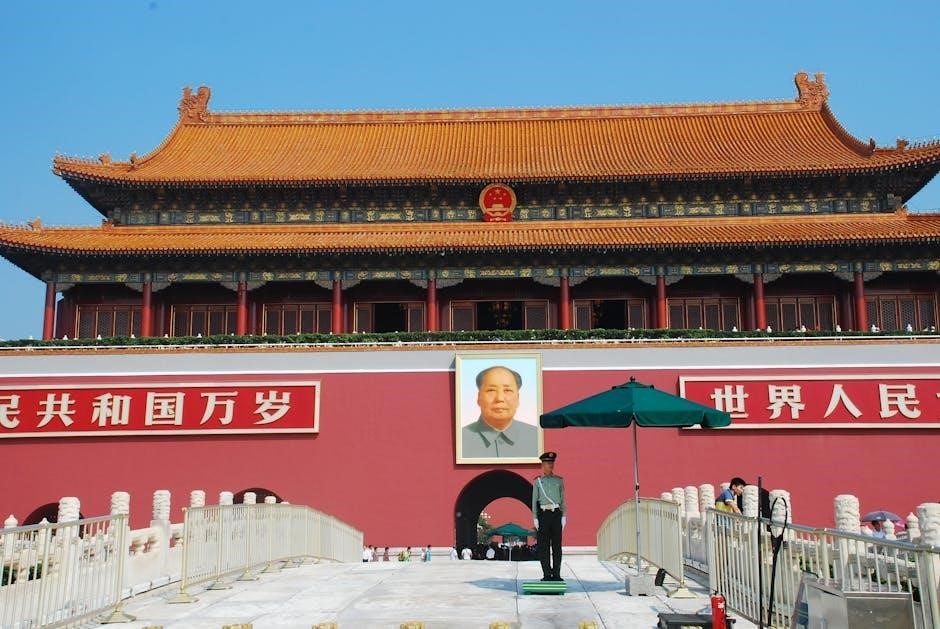
Impact on Foreign Relations and Business
Political slang in China influences foreign relations and business by creating misunderstandings and challenges in diplomatic communication, requiring careful navigation of cultural and linguistic nuances to avoid misinterpretation.
8.1 Slang in Diplomatic Communication
Political slang in China poses unique challenges in diplomatic communication, often leading to misunderstandings due to its nuanced and context-dependent nature. Diplomats must navigate complex translations and cultural references, requiring deep linguistic and cultural understanding. Misinterpretations can escalate tensions or create unintended offense, highlighting the need for precise communication strategies. Additionally, the rapid spread of slang via internet platforms complicates efforts to maintain clear and consistent messaging in international relations.
8.2 Role of Slang in Business Negotiations
Political slang plays a subtle yet significant role in Chinese business negotiations, often influencing trust-building and relationship dynamics. Misuse of sensitive terms can lead to unintended offense or misinterpretation, potentially derailing deals. Understanding cultural nuances and avoiding politically charged slang is crucial for foreign businesses. Effective communication strategies involve blending professionalism with cultural awareness, ensuring that slang use aligns with the political and social context of negotiations.
8.3 Advice for Foreigners Using Chinese Slang
Foreigners engaging with Chinese slang should exercise caution, avoiding politically sensitive terms. Understanding the historical and cultural context of slang is essential to prevent unintended offense. Leveraging trusted resources and local insights can help navigate its complexities. Additionally, being mindful of censorship guidelines ensures respectful and effective communication in both personal and professional settings. Awareness and sensitivity are key to using slang appropriately in China.
